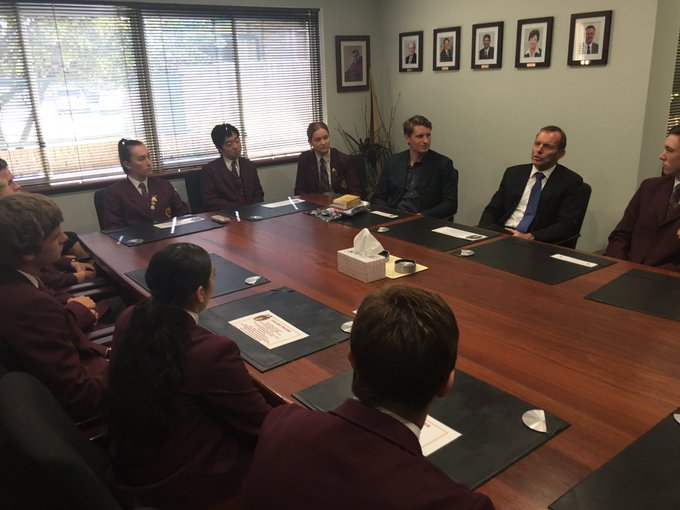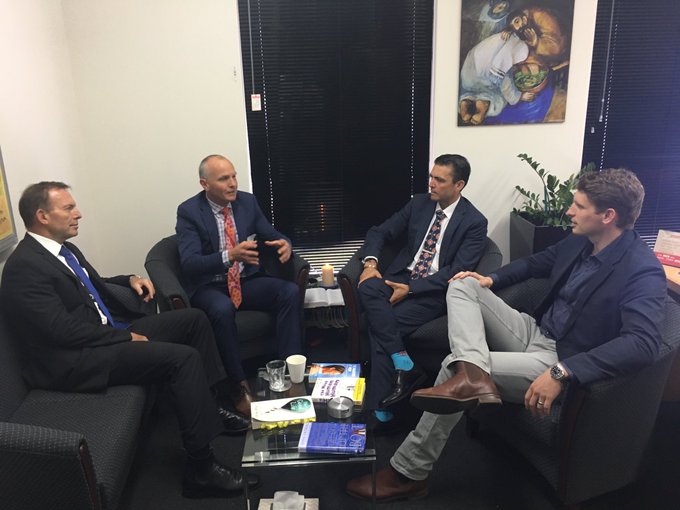Malcolm and Lucy Turnbull board an airplane to the United States on Wednesday, for a meeting with US President Donald Trump in New York. Paul Millar/AAP Image
When the public are deeply cynical and distrustful, and have turned their back on a government, can that government change its image and the voters’ view?
Malcolm Turnbull is desperately trying to drive an affirmative answer. His efforts involve policy U-turns, interventionist roads usually untravelled by the Coalition, and personal positions he’d have once avoided.
What nobody can predict is whether it will all add up to success or simply end in a confirmation of the present polling that points to a Shorten government.
Tuesday’s budget is a key milestone in the Turnbull mission, and its broad outlines are becoming clearer.
The government is trying to claw back ground in areas of maximum Coalition vulnerability – health and education. We know there’ll be a phased-in lifting of the long freeze on the Medicare rebate, in what is likely to be a substantial health package aimed at protecting the government against another Mediscare.
This week’s announcements on schools and universities came early to give them breathing room or, with higher education, to get more unpalatable news out before budget night.
Across-the-board initiatives on housing affordability for owners and renters will be sold as responses that don’t carry the risks of Labor’s more drastic approach. Michael Sukkar, Assistant Minister to the Treasurer, confirmed on Thursday there will be help for first home buyers to get together their deposit.
The budget will portray the government as nation-building, committed to big projects – expanding the Snowy Hydro, constructing the second Sydney Airport, getting underway the Melbourne-to-Brisbane freight line, the last particularly important to the Nationals.
Above all, the government will pitch this budget as “fair”. Its message, implicit and explicit, is that this is SO different to 2014.
It is sounding more like a pre-election budget than one you’d expect at the start of the parliamentary cycle. Its 2016 predecessor did indeed launch an election campaign, but was dominated by the voter-unfriendly $48 billion ten-year company tax cut plan.
While this budget seems tailored to be audience-friendly, the government also must meet the test of economic responsibility – the ratings agencies would react badly if it didn’t.
There haven’t been signs of harsh savings, though no doubt a few pinch points will emerge. The “good debt” and “bad debt” distinction made by Scott Morrison has given a taste of the economic narrative. But how the Treasurer will get to a credible bottom line is yet to be revealed.
This week’s higher education policy wasn’t a surprise, unlike the dramatic turnaround on schools, which caught Labor totally off guard.
The tertiary policy puts a greater cost burden on students and some squeeze on universities, but it’s nothing like as punitive as the one dumped out in the 2014 budget, only to be sunk by the Senate.
The schools policy has a distinctly Turnbullesque flavour. Despite earlier Coalition scepticism about the efficacy of more dollars, it embraces the Gonski approach on needs-based funding, and commits to an extra $18.6 billion over a decade. And Turnbull enlisted his good friend David Gonski himself to do a new report, this one on how to get better outcomes for and from Australian students.
To have Gonski standing beside Turnbull and Education Minister Simon Birmingham and welcoming the policy was a coup of the first order.
Maybe the sheer audacity of it all accounted for Labor education spokeswoman Tanya Plibersek’s initial shrillness, with her outburst against an “act of political bastardry”.
The ALP not only has to work out its response to the core of the policy – to which the Greens have seemed more amenable than Labor. The opposition must also craft a counter for the election in this suddenly more contested area. Labor denounced the policy’s shortfall of $22 billion compared with its own promised spending, but on Thursday Plibersek was not committing absolutely to providing that amount.
But what might be seen as an inspired political move by Turnbull hasn’t come trouble-free. Some 24 schools will lose money, and 353 will be worse off than they would otherwise have been. These are small and justified “hit lists”, but losers can bruise, even though Labor is being bipartisan about those facing funding cuts.
Most important, Catholic education authorities, enjoying previous special deals, are noisily unhappy.
Tony Abbott – who can’t be enjoying this week’s pointed contrasts with 2014 – is tapping into Catholic discontent. The schools policy is an opportunity to differentiate himself from Turnbull and appeal to some in the conservative base.
On Thursday he was in Western Australia appearing at Mandurah Catholic College. He tweeted:
The previous day, pointing out that the schools policy hadn’t been to the party room, Abbott predicted there would be a vigorous debate at the party meeting when parliament resumes next week.
Birmingham has indicated he won’t capitulate to “bullying” for new special deals although he’s open to limited transition arrangements in certain cases.
The government argues the Catholic schools are getting a fair deal and the sector will have flexibility to determine the spending within it. But sometimes “fairness” is not actually what’s at issue.
The 2016 superannuation changes are a salutary tale of how a fair policy blew into a storm in the “base”, forcing the government eventually to make alterations. The reverberations are still being felt, fuelling discontent against Revenue Minister Kelly O’Dwyer in her seat.
The strength of the Catholic backlash has yet to be tested, as is the concern among Coalition backbenchers. The Catholics are a powerful, well-organised lobby. It’s hard to judge how the government would react if the heat built.
If this issue turned into a proxy battle between Turnbull and Abbott – playing the role of advocate for the Catholic school sector – things could get tricky.
This article was written by Michelle Grattan –  [Professorial Fellow, University of Canberra]
[Professorial Fellow, University of Canberra]
This article is part of a syndicated news program via the Conversation








